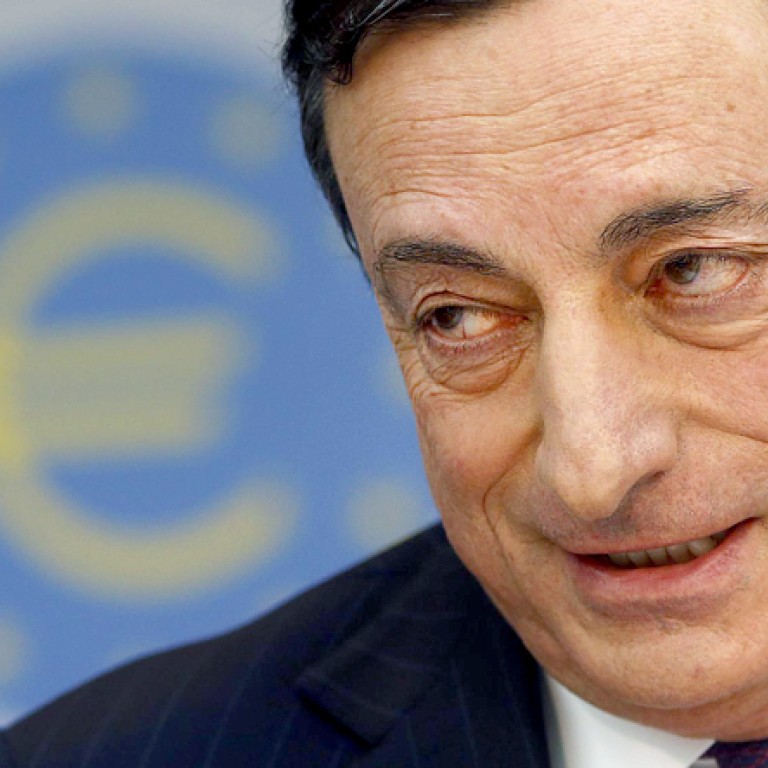
Euro zone sucked into a black hole
Blame for the euro-zone's laggard recovery lies squarely with the ECB for its failure to cut rates earlier, and its benign neglect towards a strong euro
The gravitational pull of the black hole of recession is still dragging on many individual euro-zone economies, despite the region as a whole claiming it has reached escape velocity.

The blame for this laggard recovery lies squarely with the European Central Bank.
ECB president Mario Draghi might insist that he will do all that is necessary to return the region to sustainable growth, but the terrible track record of the institution he heads means his words inspire little confidence among companies and investors depending on him to do so.
Where the United States Federal Reserve pulled out all the stops with proactive, pro-cyclical stimulus starting from late 2007, the ECB dragged its feet and badly miscalculated.
Jaw-dropping rate tightening in 2008 and 2011, when the euro zone was staring into the recessionary abyss, was not the ECB's only mistake.
It paid too much regard to the Bundesbank's fears that monetary stimulus would translate into galloping inflation and so deprived itself of a crucial weapon in the fight against recession - quantitative easing.

When the ECB did finally begin to respond to the unmistakable deepening of the crisis, the missteps simply mounted.
The ECB pumped more than €1 trillion (HK$10.6 trillion) of liquidity into the bloc's financial system to shore up the banking sector, but it resoundingly failed to ensure this flood of extra liquidity reached the most parched parts of the economy - consumers and business.
Credit is the lifeblood of a durable recovery and the heart of the euro zone's monetary circulation has all but stopped beating. Annual money supply growth has a barely detectable 1.3 per cent pulse, well below the ECB's 4.5 per cent M3 reference target for health.
Bank lending to the private sector has suffered badly.
Growth in euro-zone mortgage borrowing has slowed to 0.7 per cent year on year. Even worse, consumer credit and loans to the corporate sector are still contracting at a 3 per cent annual rate. They have been doing so for years.
The domestic credit contraction has opened up deep fissures in economic confidence and bodes badly for recovery prospects ahead.
These economic and social fractures are scary.
In Italy, Spain and Greece, business and consumer confidence lies crushed - unemployment is super high, fiscal attrition is causing social friction, and steep balance sheet deleveraging is piling up the economic misery.
The combination leads to deepening economic decay and mass unemployment, which in turn raises political uncertainty and the risk of social disorder. That has been the experience in Greece and in Italy, where 40 per cent youth unemployment is hardly any foundation for a stable and thriving society.
The ECB cannot calibrate policy to suit Germany and hope that the bloc's most powerful engine can haul the rest of the region back into a sustainable growth orbit. If the euro zone sinks, Germany will fall with it. The extreme inter-dependence of the euro-zone economy virtually guarantees that.
So what should the ECB do?

Manufacturers have been cutting prices for the past two years and headline consumer inflation, currently at 0.7 per cent, is not going up anytime soon. The bigger risk is a dip into negative territory. Against that backdrop, an ECB rate cut must be on the cards.
The ECB must plan for the long haul without any second thoughts.
Second, bank lending must be freed up to meet consumer and business needs.
The banks remain under intense political pressure to expand lending, but the monetary authorities have imposed tougher capital adequacy standards to shore up balance sheets that restrict the ability to lend.
Finally, and more controversially, the authorities should soften their line on the euro.
With economic headwinds blowing harder from China and emerging markets, exporters need every ounce of leverage they can muster in the fight for growth. A weaker euro could easily be factored into the ECB's deflation fight to get back on track to the 2 per cent inflation target.
With the March policy meeting now clearly in view, cutting the deposit rate below zero and charging banks for holding money at the ECB would be the sensible options - incentivising banks to lend rather than hoard money and injecting new lifeblood into the fledgling recovery.
March could mark a fateful moment of truth for the ECB and the euro-zone economy.

